How to donate blood
Donate blood in Tata Medical Center:
Every day, cancer patients need blood transfusions to survive and thrive. They rely on the generosity of donors like you, who help ensure a safe, healthy blood supply. Make an appointment to donate blood today.
Contact number:
(033) 6605 7603 | (033) 6605 7615
Timing:
Monday to Friday from 09.00 am to 05.00 pm
Saturday from 09.00 am to 04.00 pm
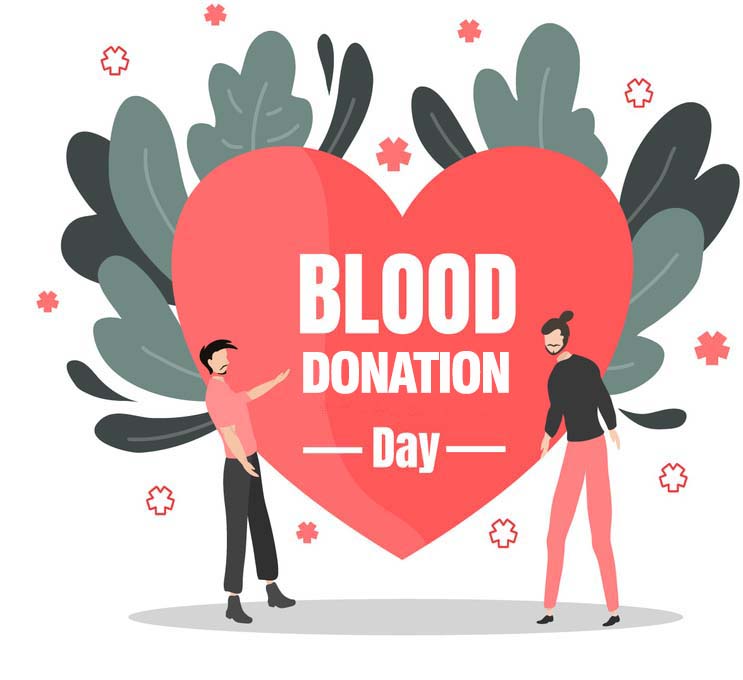
National Voluntary Blood Donation Day
(1st October)
Donate Blood Save Life Make a difference
1) Why should you donate blood at Tata Medical Blood Centre?
Tata Medical Centre is a non-profit, tertiary care oncology center that provides world class affordable treatment and care to cancer patients. Blood transfusion is one of the major supports during cancer treatment and without blood donation, transfusion therapy is not possible. The only source of blood products is from donated human blood which is processed into blood components. Therefore, we humbly request each one to come forward to donate blood, to support treatment of patients who are fighting cancer. Your noble gesture of blood donation will go a long way in saving human lives.
2) What are the eligibility criteria for whole blood donation?
Any healthy adult between 18-65 years of age, with a minimum of 45 kg body weight and hemoglobin between 12.5-17.5g/dL, is eligible for blood donation. A blood donor should be in good health, free of any disease/infection, and must be physically/mentally fit at the time of blood donation.
3) Can a person taking medication for high BP, diabetes or hypothyroidism donate?
Yes. If the above mentioned diseases are controlled with medication and there is no change in dose of the drugs within last 28days of blood donation, the person can donate. But a person taking insulin cannot donate.
4) What are the common causes of deferral for blood donation?
Anemia, underweight, jaundice, recent tattooing, recent surgery, recent malaria/dengue/typhoid infection are some of the reasons of deferral. Pregnant ladies and ladies who have exclusively breastfed babies cannot donate. A person who had jaundice due to hepatitis B or C infection any time in the past cannot donate – even if he/she is now has no symptom.
5) How long it takes to donate blood?
Actual donation process is of 10 minutes. Entire procedure starting from the registration to post donation resting & refreshment takes approximately 40 minutes.
6) How many times in a year blood donation is permissible?
The guidelines for blood donation are as per our national regulations. Healthy males can safely donate blood at 3 months interval, and female donors can donate at 4 months intervals. The interval between whole blood and single donor platelets donation should be at least 4 weeks.
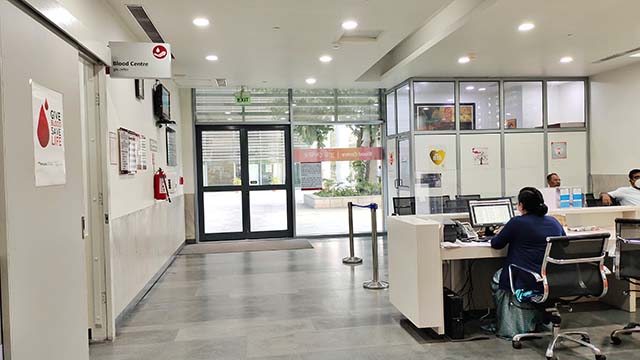
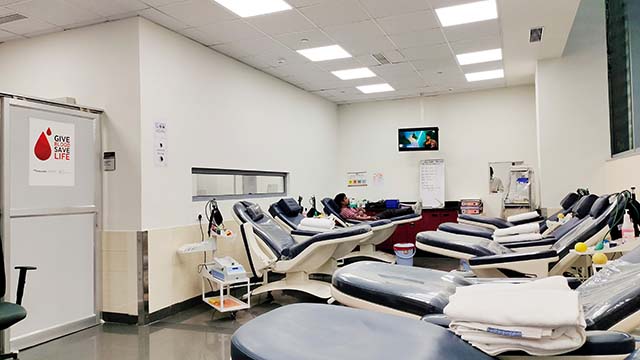
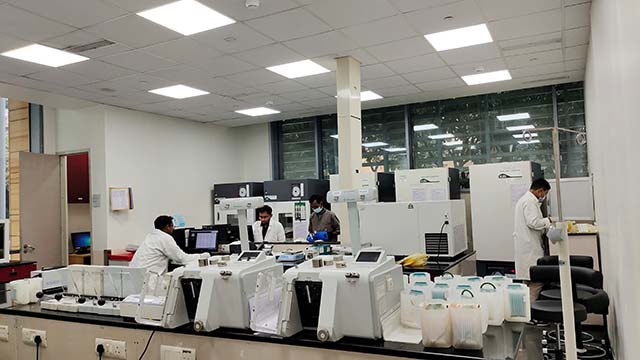
7) How much blood is collected during blood donation?
The quantity of blood collected depends on the body weight of the blood donor. Usually 350-450mL blood is collected from a blood donor, depending on his body weight. However, it is always ensured that the volume of blood collected will not harm the blood donor.
8) Is whole blood donation procedures safe?
For whole blood donation, after your medical evaluation, if you are found to be fit, then only you will donate. If you are a first time donor or nervous donor, you may experience a mild uneasiness during and after donation. If you follow the post donation instructions, you will be fine after sometime.
9) For patients admitted at Tata Medical Center, why do we prefer to use blood products only from our Blood center?
Tata Medical Center uses cutting-edge technology using the latest automated platforms and testing materials of higher generation. This reduces the window period of the tests performed, there by greatly minimizing the risk of transmitting infections by transfusion and so improves patient safety. In addition, quality checking of the product is maintained at each stage of the transfusion chain, to ensure maximum patient safety. As majority of our patients are immune-suppressed due to cancer, for patient safety, we prefer to use blood and blood components donated and tested at our blood centre.
10) Why does TMC Blood Centre often require large number of blood donations?
During the course of treatment of cancer patients, there could be a need for all types of blood products, in large quantities and that too, over several weeks. Patients suffering from blood cancer, patients undergoing bone-marrow transplantation, those receiving high dose chemotherapy and patients requiring extensive cancer surgery, often need huge number of transfusions as compared to patients with other non-malignant diseases. Therefore at TMC Blood Centre, the demand of blood is always very high.
11) Why patient relatives are requested to donate blood for their patient?
Many local NGOs, voluntary blood donor organizations, and adjoining IT offices in the vicinity help us to arrange voluntary blood donors for our patients. In situations where the patient is transfusion dependent for a very long time or the demand is excessive or it is a rare blood group; we approach the patient’s relatives and friends and request them to arrange blood donors for their patient.
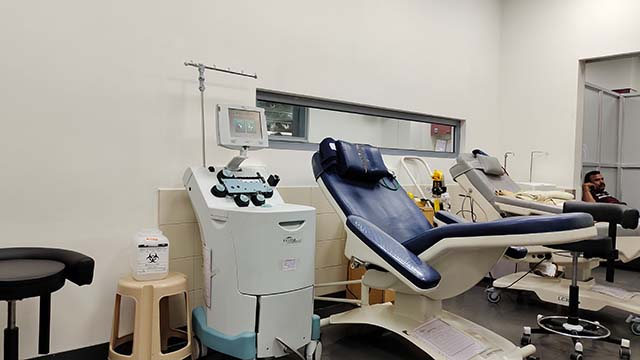
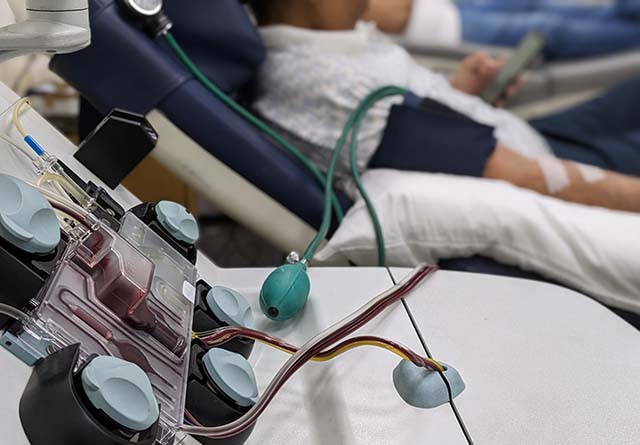
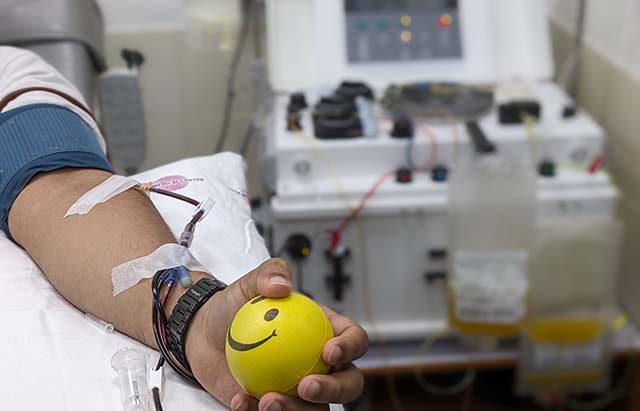
1) What is Plateletpheresis?
When only platelets are collected from a blood donor with the help of an apheresis machine; the process is called Single Donor Plateletphresis (SDP). The quantity of platelets collected by this process is much greater than that obtained from a whole blood donation. The SDP donor has to undergo certain mandatory screening tests prior to the procedure, to determine his suitability for the procedure. The SDP screening tests take about 1.5 hours and if the donor is found suitable, then the SDP procedure is performed. The SDP procedure takes about 1.5 hours and the procedure is done with a prior appointment, to avoid donor waiting except in dire emergencies.
2) What are the eligibility criteria for single donor platelet or SDP donation?
In single donor plateletpheresis (SDP), the age limit is 18-60 years and minimum body weight is 50 kg. A SDP donor should be in good health, free of any disease/infection, and must be physically/mentally fit at the time of SDP donation. Screening tests (Infective markers like HBV, HCV etc, Hb, Platelet count, Blood group) must be within the acceptable range. In case of SDP donations, minimum of two days interval is required between two consecutive SDP procedures, and a maximum of 24 SDP donations are allowed in a year.
3) What are the common causes of deferral in SDP donation?
In addition to the causes of deferral mentioned in the whole blood donation, SDP donors are also deferred due to poor venous access and low platelet count.
4) Is there any special instruction for SDP donors?
a) If you have taken pain killers (NSAIDs like aspirin, etc.) recently you cannot donate SDP for the next 72 hours.
b) Take light food before SDP donation. Don’t take heavy meals with high oil content within 2 hours before the donation.
5) Once a donor is deferred for SDP donation, can he/she donate whole blood?
You may donate whole blood if you have been deferred for SDP because of some specific reasons such as – poor venous access, weight, low platelet counts, etc.
6) Is SDP donation procedures safe?
SDP donation is absolutely safe and don’t be nervous. If you are a first time SDP donor, you may experience a mild uneasiness during and after donation similar to the whole blood donation. If you follow the post donation instructions, you will be fine after sometime. In addition to that mild discomfort around the lips, tingling sensation may be observed in few individuals. It usually disappears with the oral calcium supplementation.
7) Does a cancer patient need only platelets or other blood components are also required?
Cancer patients may require all types of blood products. These include -Red blood cells, Fresh frozen plasma, Cryo precipitate, Platelets and the requirement depends on the clinical condition of the patient. If the patient develops infection or other complications, then there could be a need for all types of blood products in large quantities.
8) What is the timing for SDP donation at Tata Medical Center?
Monday to Friday:-
Only SDP screening:- 09.00 am to 04.00 pm
SDP screening and procedure on same day:- 09.00 am to 02.30 pm
SDP procedure of already screened donors:- 03:30pm
Saturday:-
Only SDP screening:- 09.00 am to 03.00 pm
SDP screening and procedure on same day:- 09.00 am to 12.00 pm
SDP procedure of already screened donors:- 02:30pm
- Take more fluids than usual on the day of blood donation.
- Take light refreshment after donation.
- Take rest for 30 minutes after donation.
- Raise your arm and apply direct pressure on the puncture site to stop bleeding.
- Lie down or sit down with head between knees if you feel dizzy.
- Do not lift or carry heavy weight for next 12 hrs.
- Do not remove the band aid immediately from the phlebotomy site.
- Do not smoke or chew tobacco for at least 2 hrs.
- Do not take alcohol for the day.
- Do not drive for next 1 hr.
- There is NO requirement of special nutritional supplement after blood donation.
CONTACT INFORMATION
Call Us: (033) 6605 7222
Write Us: appointment@tmckolkata.com
For Other Queries:
Call Us: (033) 6605 7000
Write Us: info@tmckolkata.com
For Feedback:
Call Us: (033) 6605 7095 | 9330903299
Write us: info@tmckolkata.com or Click on Feedback
For Patients
FOLLOW THE LINKS
Tata Medical Center, Kolkata
14 MAR (E-W), New Town,
Rajarhat, Kolkata 700 160
West Bengal, India.
